In downtown Kent, outdoor dining seen as key to economic recovery
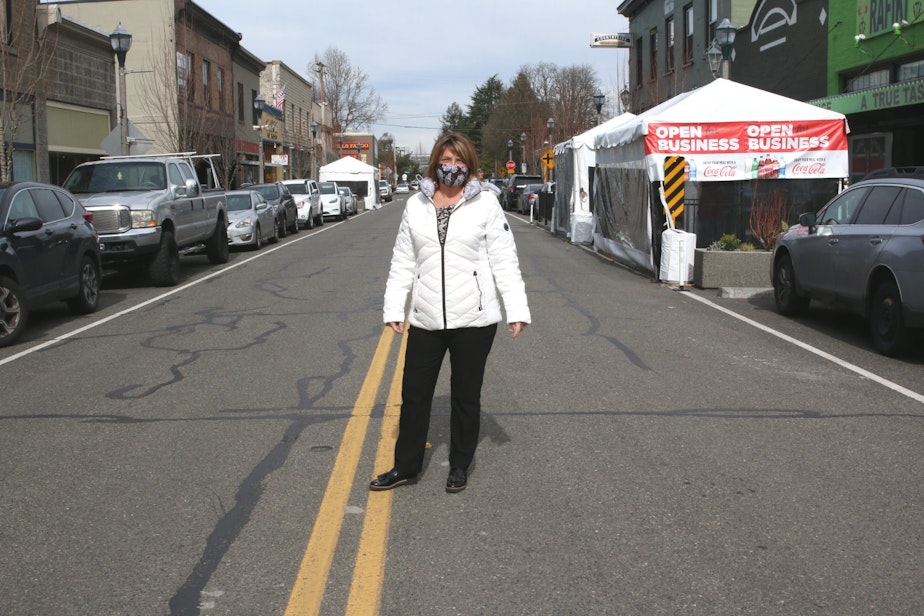
The American Rescue Plan will send over a billion dollars directly to cities in Washington State.
Cities will spend some of their money helping small businesses offset the costs of operating during the pandemic. The city of Kent is trying to use federal relief money in new ways.
This story is part of The Main Street Project, a series that documents the impacts of the pandemic and economic recovery one street at a time.
First Avenue South runs through Kent’s historic downtown core. The street has lots of restaurants including the Iron Pot, a Korean restaurant owned by Kyung Lee. He used to own a restaurant in Seattle.
“I never feel like I got help from the city," he says. "But since I move here – Kent is amazing, they help me a lot.”
Lee says Kent’s strategies have helped him attract new customers.
“I’m really happy,” he says.
Sponsored
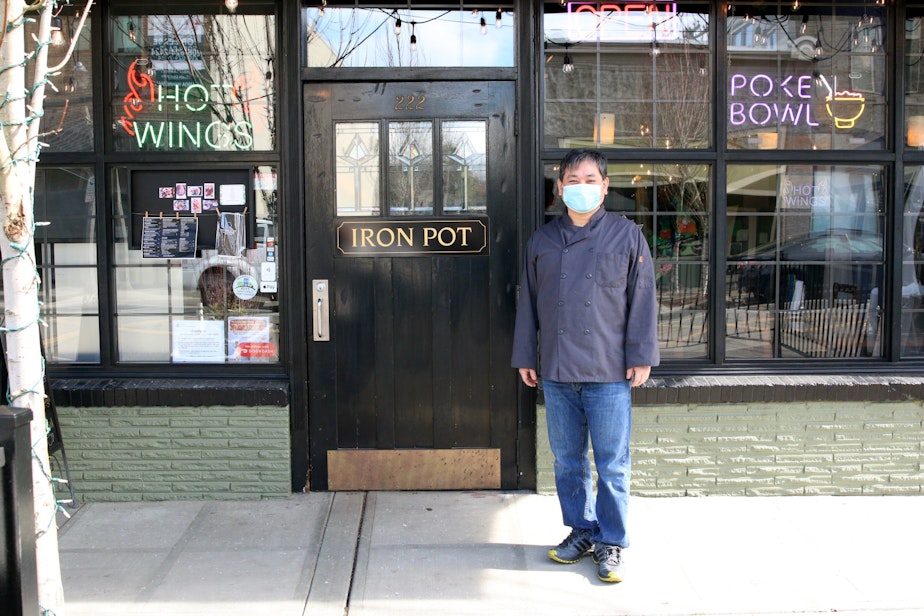
So what is Kent doing, to earn this kind of praise? Local business owners like Lee say, on this street, it really comes down to two things: they've built outdoor dining structures; and on Saturdays in the summer, they’re closing the street to car traffic. The city paid for these efforts using federal relief money, from the CARES act.
In front of Lee’s business is a parklet: a covered dining structure built in the lane where people used to park. It's made of durable Trex decking material. It's covered, and heated in the winter. They cost around $12,000 apiece to build, but the restaurants didn’t have to pay a dime.
Experts say outdoor dining is safer than indoor, at least if there's good air flow. That's because, even with more people getting vaccinated, we haven't reached herd immunity yet. And so, restaurants are preparing for another summer of outdoor dining.
Joseph Kahono is the owner of Rafiki, an East African Restaurant on Kent's 1st Avenue. He has noticed the parklets have been popular with his customers.
Sponsored
"The reason people go out is they want to dine where they’re going to buy the food. So people can come in, although they are not coming inside the restaurant – but they will be in the tent – they enjoy. So that’s a good extra money for us, for the city, and for everybody else.”
Kahono says he hopes his parklet can remain after the pandemic ends.
“Oh, if you ask me, we want this forever," he says. "And especially when I saw that they use the Trex material, that is a long lasting, as compared to wood … In my mind, I was like, they are preparing for something that is permanent. I was very happy about them. It’s very expensive. They use the metal rails, too. And they are well secured.”
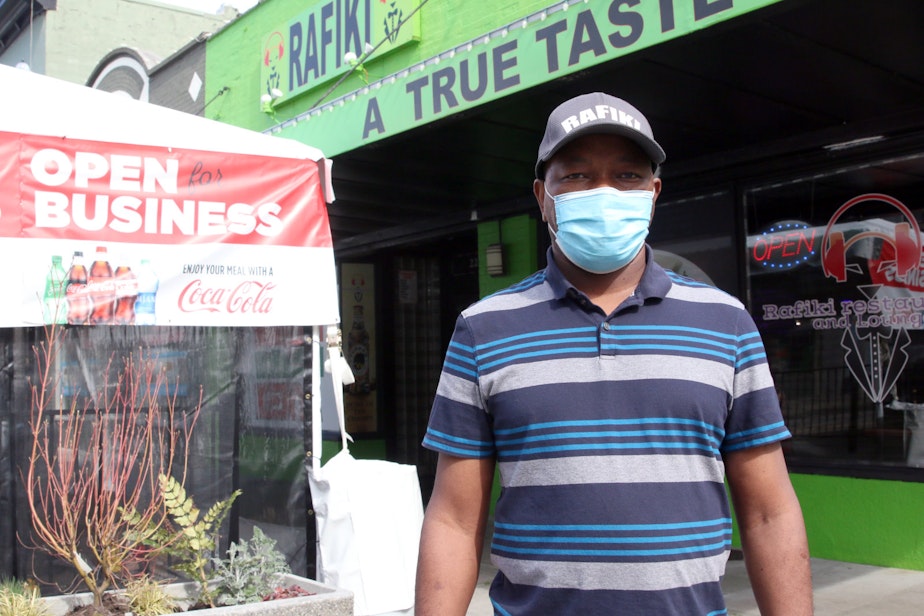
The other thing the city’s doing – closing the street to cars every Saturday in summer – makes even more room for dining, along with farmers and wine tastings, and other outside activities.
Sponsored
The city calls this “First Avenue Inside Out" and tried it last year for the first time.
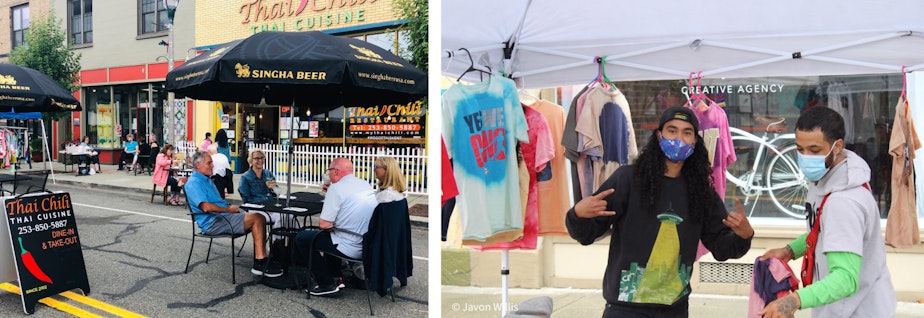
Outside the Rusty Raven, which sells locally-made arts and crafts, Malinda Besset likes to set out a table covered with strangely shaped pieces of fabric. In front of these, she puts a sign that says “bowl cozies.” Often, people walking by on their way to eat somewhere ask her: "What’s a bowl cozy?"
That’s when she typically jumps in with her sales pitch.
“OK, so the idea is, you know how you take a bowl out of the microwave, and it’s super hot, and you’re like, 'Ouch, that bowl's hot, I have to let it sit?' Now, you can just pull it straight out because the fabric on the bowl cozy’s protecting that bowl. You can also use it for ice cream so you don’t have cold hands.”
Sponsored
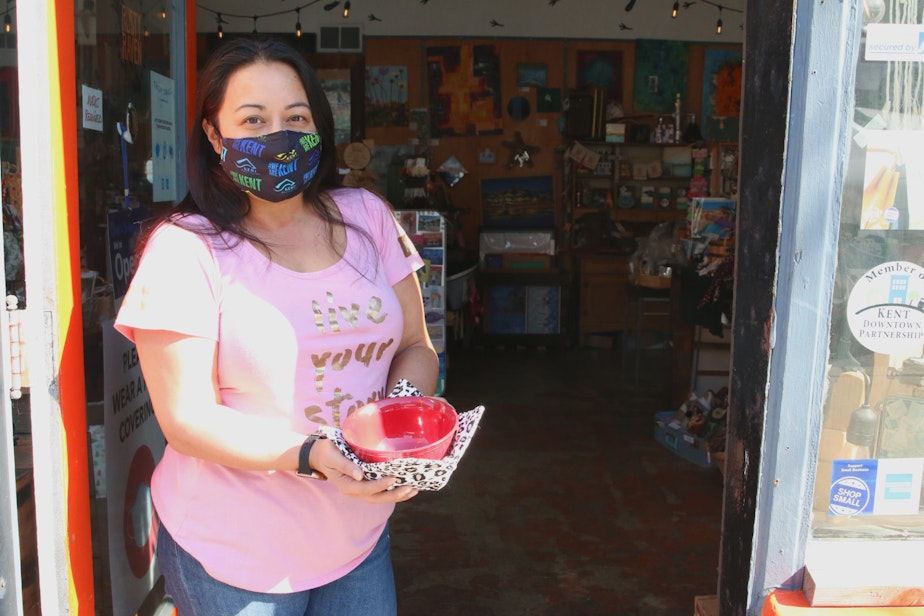
Bessett says Kent’s street closure connected her with new customers, and that helped Bowl Cozies become her best seller last year. She had to hire a second local artisan to double production. It hasn’t made her rich, but it’s helped her store through a difficult year.
Gaila Haas runs the Kent Downtown Partnership, which acts as a liaison between the city and the business community here. She says the pandemic has changed what the city believed was possible on this old street.
“Previous to Covid, it would have been much more challenging to do parklets and take up parking spaces within the street, mostly for liability purposes, but also ... there’s certain requirements regarding parking,” she said.
But the pandemic helped Kent officials see the big picture. By helping restaurants, the whole street benefits. And people like having a place to go, and a reason to go there.
Sponsored
RELATED: Hear and read more stories from The Main Street project.
“Pandemic or not, what we’ve learned is that this is a great way to engage the space down here, regardless," Haas said. "It feels awesome. I love the vision that’s unfolding because of this.”
Who knew downtown Kent would become known for European style outdoor dining?
Other cities have also tried letting restaurants serve tables on the street, but the restaurants usually have to pay to build the dining structures themselves.
Recently, Gaila Haas has been sharing Kent’s experience with peers in other cities throughout Washington state. And with new funding from the federal government on its way to these cities, Haas expects these ideas to spread.




